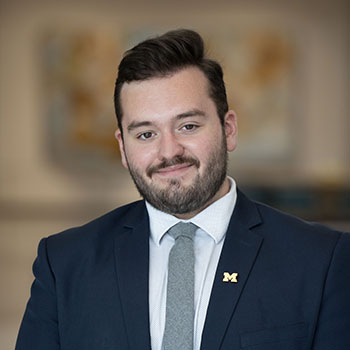
CEE students off campus
CEE students help teach the next generation of engineers about using math and science to solve real-world problems.

CEE students help teach the next generation of engineers about using math and science to solve real-world problems.

When you think of second-graders building bridges, the image that springs to mind likely involves brightly-colored wooden blocks. With all due respect to blocks, students at Bates Elementary in Dexter, Michigan, get to play with something much cooler. Every year since 2008, Jason McCormick, CEE Associate Professor, has visited Bates Elementary with a group of undergraduate and graduate students as part of the “Building Bridges” program. After a short talk and video about engineering and trusses, each undergraduate and graduate student is paired with two to four second-grade students to design bridges using the West Point Bridge Designer software.
“We’re trying to introduce the basic idea that engineering is using math and science to solve real-world problems,” McCormick said. “We connect it to shapes for them – like how a triangle is a better shape for a bridge than a square.” “Usually the design portion becomes a friendly competition and the kids really enjoy it.”
In addition to introducing kids to engineering at a young age, the program also provides a chance for graduate students to practice communicating about their work to a different audience, a skill that will serve them well in their future careers.
“I always like working with and teaching young kids,” said Ahmed Abdelhady, graduate student in civil and environmental engineering who participated in the program this summer. “They are awesome…very excited and interactive.”

Every school year, students from kindergarten through twelfth grade prepare to participate in Science Olympiad, a non-profit organization that aims to increase interest in science by sponsoring tournaments and other events. In 2013 when CEE PhD candidate Elizabeth Agee heard that the Science Olympiad team at A2STEAM Elementary had a shortage of volunteer coaches, she knew what she had to do.
“I participated in Science Olympiad at the high school level and had a very positive experience,” Agee said. “Events like Science Olympiad really solidified my love of science and engineering and encouraged me to pursue it as a career. I couldn’t let these kids, who were willing and able to participate in science, miss an opportunity to do so!”
Agee has been coaching third- through eighth-grade students ever since, guiding them through topics ranging from general ecology to water rockets, where students work together to design and build water-propelled rockets from recycled two-liter bottles and other basic materials. At the official competition, rockets are judged on how long they are able to stay afloat with the student-crafted parachutes. Besides the obvious benefits of getting to launch water rockets, Agee says that volunteering as a Science Olympiad coach has also helped her to be a better engineer.
“Coaching Science Olympiad has made me think a lot about how to communicate in more effective and accessible ways,” said Agee. “The same skills that I utilize in teaching the students difficult concepts can be used to communicate my research to broad audiences, increasing the impact of the work I’m doing here at the University of Michigan.”
Agee’s research at the University of Michigan focuses on ecohydrology, the interactions between the hydrosphere and the biosphere and how they change across space and time. Her dissertation work examines the contributions of tree root systems to drought resilience in the Amazon rainforest.

In the summer of 2017, a group of University of Michigan students took a course in Sustainable Engineering as part of a study abroad program in France. Some of those students found themselves particularly interested in the clean water portion of the course – so interested, in fact, that when they returned to campus in the fall, they reconnected to apply what they had learned to real-world problems.
The result is Team Aquador, a student organization focused on creating a sustainable water treatment system to clean contaminated fresh water sources in several regions of Ecuador, particularly the coastal regions that were heavily affected by the 2016 earthquake. Team Aquador includes CEE undergraduate students Rohan Chandran (Class of 2020) and Jill Porretta (Class of 2019), both of whom have taken courses on sustainable and environmental engineering principles to give them a solid knowledge base for approaching the problem. What they learned in this course helped them decide on a slow sand filter as a means of filtering the water. But their education didn’t stop once they left the classroom.
“Being a part of Team Aquador has allowed me to gain a lot of hands-on experience that I wouldn’t have been able to obtain in a classroom setting,” Porretta said. “Constructing the actual slow sand filter, for example, taught me a lot about problem solving and adjusting the design to accommodate for any problems that may arise.”
In the summer of 2018 the team traveled to Ecuador to perform a site assessment and talk to members of the communities they wanted to help. Their goal is to implement a system that will be easy for local communities to use and maintain, with a design that incorporates material found in the area so that community members can continue making their own water treatment systems.
“We were able to immerse ourselves in the culture and talk to people all over the country about what they were looking for in a water filtration and purification system,” said Porretta. “We plan to use their suggestions to further develop our design this year.”
The team continues to refine their design and plans to return to Ecuador in the future.
“With a year of trial and error on our filters and our first trip to Ecuador complete, I’m excited to see what we’ll be able to do next year,” Chandran said.

Marketing Communications Specialist
Department of Civil and Environmental Engineering